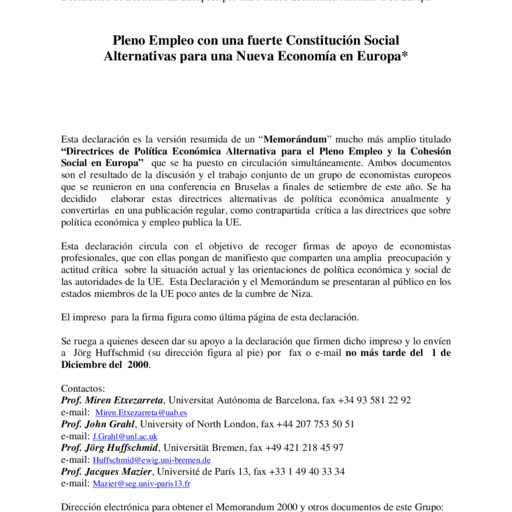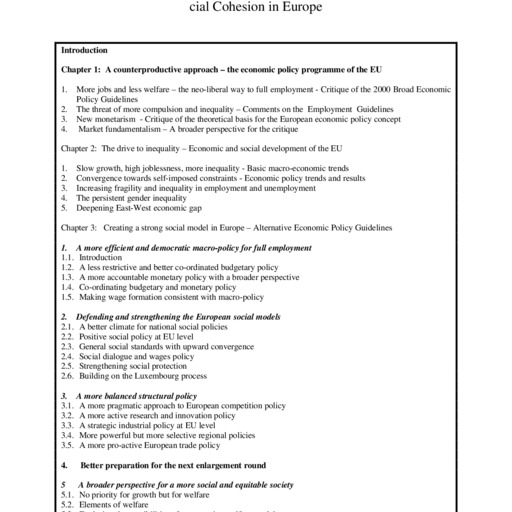Pleno Empleo con una fuerte Constitución Social
Alternativas para una Nueva Economía en Europa
Fitxa
- Baliabide klasea
- Report
-
Izenburua (dcterms:title)
-
Pleno Empleo con una fuerte Constitución Social
Alternativas para una Nueva Economía en Europa
-
Deskripzioa (dcterms:description)
-
The text is available in English, French, German, Hungarian, Italian and Spanish.
Additionally there is a long version in English and German available.
Summary
1. Contrary to the very optimistic official presentations to the public, the economic and social situation in the EU must give rise to great concern: the current recovery is fragile, unemployment continues to remain at intolerably high levels, roughly four times the levels of the 1960s, and inequality in all forms is increasingly spreading all over Europe: inequality in income distribution, precarious working conditions, rising poverty, the persistent gender gap and the new dimension of inequalities between Eastern and Western Europe.
2. The economic and social policy of the European Union is criticised because of its uniquely narrow view and approach. On the macroeconomic side the exclusive fixation of monetary policy on price stability and the obsession of fiscal policy with budget deficit reduction have contributed to the current high level of unemployment and are likely to continue to do so in the future. At the same time social policy, under the heading of an "activating welfare state”, is reducing the social content of full employment, eroding social cohesion and solidarity, increasing inequality in many forms, while at the same time imposing more elements of compulsion and repression onto the weaker parts of society.
3. As an alternative to this regressive course of policy we propose
- a more efficient and more democratic macroeconomic policy for sustainable growth and more socially rich employment on the way to full employment. Ways to this end are a more expansionary fiscal and a co-operative monetary policy as well as control over exchange rates and financial markets;
- a stronger social policy with the aim of creating a social constitution which gives every individual living in the EU the unconditional right to a dignified life. Ways to this end are on the one hand measures to improve the conditions for progressive national policies and on the other hand specific European measures like the adoption of minimum standards for social expenditure in general and for specific purposes like health or child care in particular;
- more balanced structural policies with particular emphasis on a more pragmatic view in competition policy, a stronger research and development policy, a strategic industrial policy, a better targeted regional and a more active trade policy;
- a better and more determined preparation for Eastern enlargement: the completion of institutional reforms should be dropped as precondition for enlargement, generous transition periods should be negotiated for mutually sensitive areas, and transfer payments should be substantially enhanced in order to facilitate the accession.
- The development of conceptions for a more radical restructuring of the economy and society, where not growth but welfare of the people is the central point of reference and individual and collective reproduction will be organised in new ways.
Source: ·EuroMemo
-
Hizkuntza (dcterms:language)
-
eng
-
spa
-
Formatoa (dcterms:format)
-
application/pdf
-
Identifikatzailea (dcterms:identifier)
-
ME_BD_0233
-
euromemorandum_spa_2000.pdf
-
euromemorandum_long_en_2000.pdf
-
Sarbide eskubideak (dcterms:accessRights)
-
info:eu-repo/semantics/openAccess
-
Kolaboratzailea (dcterms:contributor)
-
Ereiten Kultur Zerbitzuak S.L.


